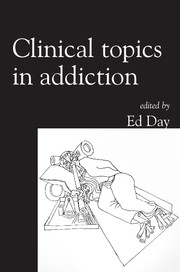Book contents
- Frontmatter
- Contents
- List of tables
- List of boxes
- List of figures
- List of contributors
- Foreword by Nat Wright
- Preface
- 1 What works in drug addiction?
- 2 The development of the drug treatment system in England
- 3 Stimulant use still going strong
- 4 Adverse effects of khat: a review
- 5 What the clinician needs to know about magic mushrooms
- 6 What works in alcohol use disorders?
- 7 Management of alcohol detoxification
- 8 Nicotine addiction and smoking cessation treatments
- 9 Pathological gambling: an overview of assessment and treatment
- 10 Use of investigations in the diagnosis and management of alcohol use disorders
- 11 Laboratory investigations for assessment and management of drug problems
- 12 Pharmacotherapy in dual diagnosis
- 13 Dual diagnosis: management within a psychosocial context
- 14 Treating depression complicated by substance misuse
- 15 Treating anxiety complicated by substance misuse
- 16 An overview of psychological interventions for addictive behaviours
- 17 Motivational interviewing
- 18 Substance misuse in adolescents
- 19 Management of drug misuse in pregnancy
- 20 Intoxication and legal defences
- 21 Substance misuse and violence: the scope and limitations of forensic psychiatry's role
- 22 Literary and biographical perspectives on substance use
- Index
5 - What the clinician needs to know about magic mushrooms
Published online by Cambridge University Press: 02 January 2018
- Frontmatter
- Contents
- List of tables
- List of boxes
- List of figures
- List of contributors
- Foreword by Nat Wright
- Preface
- 1 What works in drug addiction?
- 2 The development of the drug treatment system in England
- 3 Stimulant use still going strong
- 4 Adverse effects of khat: a review
- 5 What the clinician needs to know about magic mushrooms
- 6 What works in alcohol use disorders?
- 7 Management of alcohol detoxification
- 8 Nicotine addiction and smoking cessation treatments
- 9 Pathological gambling: an overview of assessment and treatment
- 10 Use of investigations in the diagnosis and management of alcohol use disorders
- 11 Laboratory investigations for assessment and management of drug problems
- 12 Pharmacotherapy in dual diagnosis
- 13 Dual diagnosis: management within a psychosocial context
- 14 Treating depression complicated by substance misuse
- 15 Treating anxiety complicated by substance misuse
- 16 An overview of psychological interventions for addictive behaviours
- 17 Motivational interviewing
- 18 Substance misuse in adolescents
- 19 Management of drug misuse in pregnancy
- 20 Intoxication and legal defences
- 21 Substance misuse and violence: the scope and limitations of forensic psychiatry's role
- 22 Literary and biographical perspectives on substance use
- Index
Summary
Summary Some species of mushrooms are classified as hallucinogenic drugs, although strictly speaking the phenomenology is usually in partial form, such as illusions. Some perceptual and associated mood disturbances can be highly distressing, and clinicians are more likely to encounter acute anxiety or confusional states than see mushroom users electively presenting at drug services. There are also short-term physical adverse effects, and severe poisoning may result if the ‘wrong’ type of mushroom is taken. Treatment of psychiatric complications is symptomatic, with no special approaches in this form of substance misuse.
‘Magic mushrooms’ refer to mushrooms that grow naturally and have hallucinogenic (sometimes called psychedelic) properties. Different species have been consumed in various cultures over the centuries, with use in ritual ceremonies in Mexico being particularly well known. In the UK at present the species most commonly used is Psilocybe semilanceata, also known as the liberty cap mushroom. This grows in many areas, particularly in dark places and after heavy rainfall, with fruition occurring from September to November. It is creamy-yellow or brown in colour, very small (5–15 mm across) with a thin fragile stalk. In the USA a closely related type is used.
The active chemical psilocybin is categorised in class A in the UK's Misuse of Drugs Act 1971, so in theory there can be severe penalties for offences. However, possession of the mushrooms in their natural state is not illegal; charges can be brought only if they have been prepared in some way for consumption (see below).
Usage
Psilocybe semilanceata mushrooms (to which the rest of this chapter refers) can be eaten raw, cooked or brewed into a liquid. They may also be dried, sometimes for keeping for later use, and the dried form can be put into cigarettes, a pipe or home-made capsules. There have apparently been rare instances of injecting the liquid form.
Because the mushrooms are small, about 10–100 are typically used at a time. Nearly all usage is personal or within small groups, and there is no significant illicit market. They are commonly used experimentally by young people: the 2006 British Crime Survey revealed that just under 1 in 10 people aged between 16 and 24 years admitted to having tried magic mushrooms (Home Office, 2006).
- Type
- Chapter
- Information
- Clinical Topics in Addiction , pp. 55 - 59Publisher: Royal College of PsychiatristsPrint publication year: 2007



